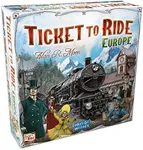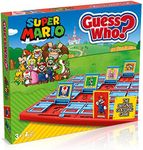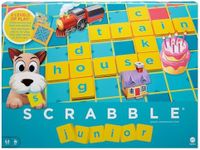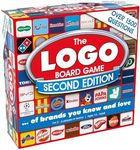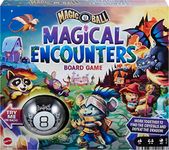Buying Guide for the Best Family Board Games
Choosing the right family board game can be a delightful experience that brings everyone together for fun and bonding. The key is to find a game that suits the interests and age range of your family members, while also considering the time you have available and the level of complexity everyone is comfortable with. A well-chosen board game can provide hours of entertainment and create lasting memories, so it's worth taking the time to consider a few important factors before making your decision.Age AppropriatenessAge appropriateness is crucial when selecting a board game, as it ensures that all players can understand and enjoy the game. Games are typically labeled with a recommended age range, which indicates the complexity of the rules and the themes involved. For families with young children, look for games with simple rules and engaging visuals. For older children and adults, more complex games with strategic elements might be more suitable. Consider the youngest player in your family and choose a game that they can participate in without feeling overwhelmed.
Number of PlayersThe number of players a game can accommodate is important to ensure that everyone in the family can join in. Some games are designed for two players, while others can accommodate larger groups. If you have a big family, look for games that can be played by multiple players, or consider games that can be played in teams. It's also worth considering games that have flexible player counts, allowing for different numbers of participants without affecting the gameplay experience.
Game DurationGame duration refers to the average time it takes to complete a game. This is important to consider based on the amount of time your family typically has for game nights. Shorter games, which last around 15-30 minutes, are great for quick play sessions or for younger children with shorter attention spans. Longer games, which can last an hour or more, are ideal for families who enjoy more in-depth gameplay and have the time to commit to a longer session. Choose a game duration that fits your family's schedule and patience level.
Complexity and StrategyThe complexity and strategy involved in a game can greatly affect its enjoyment. Some games are simple and rely on luck, making them easy for all ages to play. Others require strategic thinking and planning, which can be more engaging for older children and adults. Consider the preferences and skill levels of your family members. If you have a mix of ages and abilities, look for games that offer different levels of strategy or have adjustable difficulty settings to keep everyone engaged.
Theme and InterestsThe theme of a board game can greatly enhance the enjoyment and engagement of the players. Themes can range from fantasy and adventure to history and mystery. Consider the interests of your family members when choosing a game. A game with a theme that resonates with your family's interests can make the experience more immersive and enjoyable. If your family loves a particular movie, book, or hobby, look for games that incorporate those elements to add an extra layer of fun.

